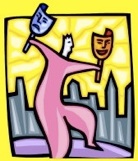
In my own experience as a caregiver, it was recalling the past that best engaged my 93 year old mother in articulate conversation When engaged in conversation about the now, she would ask a question about her current state, such as "Where is the dog? ..." every 2 minutes, even when answered every time. It was not out of spite that she would repeat and repeat these questions, she simply could not retain the information. But when she spoke of her youth, when asked about her job at Lord and Taylor's in NYC when she was in her 20s, she could describe the exact dress she bought with a matching coat and hat when dating my father, and how much he liked that particular ensemble ... and could carry on that conversation in a linear way for MUCH longer than she could remember the answer to "Where is the dog?" ... even when the dog was sitting at her feet! Or, when played a song from the 1930s, could tell you exactly where she was when she first heard that song, and perhaps, how she and her sisters would dance together to the music on Saturday morning, when helping with the housekeeping with her own mother, Mama ...
When ArtsCare ( www.artscareus.org ) visits a facility, we use the arts as a vehicle to engage the elderly in activities that can increase their motor and social skills, or reduce their level of anxiety. Music is a great resource - William Congreve is credited with having said "Music hath charms to soothe a savage beast, to soften rocks, or bend a knotted oak." We need to be credited with USING this blessed tool.
Ask questions about the past and listen. Play music from the past and watch. Participate in bring the past alive to someone living with Dementia and Alzheimer's and observe how articulate and lucid they can become. It is not easy, it doesn't always work, but when it does, there can me more than just moments of shared joy and participation between the generations.


 RSS Feed
RSS Feed


